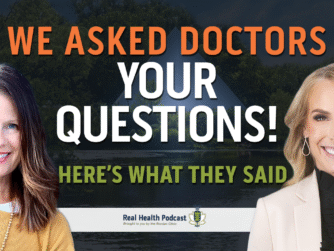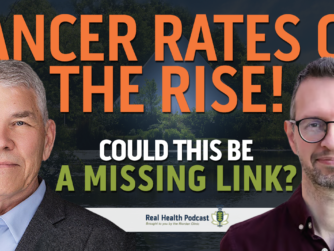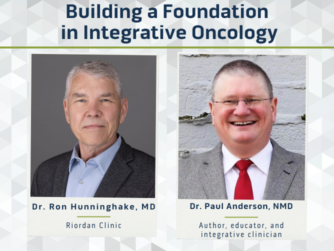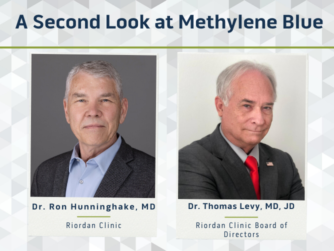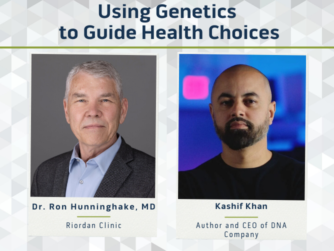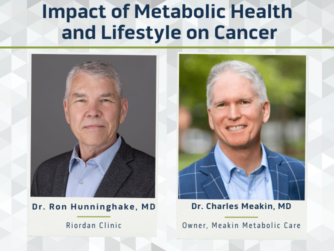In the episode, Dr. Ron talks with Riordan Clinic Nurse Annette Chlumsky. Annette has been an integrative nurse for over 30 years. She talks about how she got into nursing and why she chose the integrative patch over traditional medicine. She and Dr. Ron discuss nurses’ many roles in healing journeys and why they are trained as co-learners and not just healthcare professionals.
Thank You To This Episode’s Sponsor
Episode Transcript
Disclaimer: The information contained on the Real Health Podcast and the resources mentioned are for educational purposes only. They are not intended as and shall not be understood or construed as medical or health advice. The information contained on this podcast is not a substitute for medical or health advice from a professional who is aware of the facts and circumstances of your individual situation. Information provided by hosts and guests on the Real Health Podcast or the use of any products or services mentioned does not create a practitioner-patient relationship between you and any persons affiliated with this podcast.
Intro: This is the Real Health Podcast brought to you by Riordan Clinic. Our mission is to bring you the latest information and top experts in functional and integrative medicine to help you make informed decisions on your path to real health.
Dr. Ron Hunninghake: Welcome, everyone to the Real Health Podcast here at Riordan Clinic, and I’m Dr. Ron Hunninghake, the chief medical officer and your host for most of these podcasts. It really is truly my pleasure today to have Annette Chulmsky, who’s one of our wonderful nurses here. Tell us a little bit about herself, how you got to be at a clinic like Riordan Clinic, and a little bit about your personal journey here, and then we’ll talk a little bit about what role do the nurses play here, why are nurses so darn important?
Dr. Ron Hunninghake: And I know they are, but we want to take this step-by-step. Tell us a little bit about your getting into this type of nursing.
Annette Chlumsky, RN: Okay. Well, thank you for having me today. I think as many other healthcare professionals that now practice in functional or integrative medicine, there was a turning point or an event in their life that changed their perspectives on disease treatment. And for me, mine was in high school when my dad was diagnosed with Hodgkin’s disease, stage three already. He went the traditional route of chemo for about a year and a half, but the disease progressed. He literal went home to put his affairs in order.
Annette Chlumsky, RN: Of course, as a teenager, that made quite an impact. Then a friend introduced him to some alternative ideas. He changed his diet, a lot of supplements, and focused on his immune system. The other thing that I believe was crucial to his disease turnaround was my mother who literally poured her heart and soul into helping him survive. The whole family totally embraced a new lifestyle. So long story short, he lived to be 92 years old.
Dr. Ron Hunninghake: Wow! This was all before you went to nursing school?
Annette Chlumsky, RN: Correct. That event clearly changed my career path. I had a favorite aunt who was a nurse. I had that idea, but really wasn’t headed that direction, but I decided to do that. I’ve been so fortunate in my career that I’ve been able to find doctors who think like you do in our area and really all but one year of my total career has been in integrative care.
Dr. Ron Hunninghake: Yeah. What was it that stood out in working with some of the early… Oh, It used to be called alternative medicine, and then it was turned into what? Holistic medicine. We’re now dabbling with the words functional and integrative, but it’s obviously a different kind of medicine. What is it? What is the thing about this type of medicine that kind of got your attention?
Annette Chlumsky, RN: Well, I think for one thing, prevention of disease. Because after of my dad got sick, I thought, okay, I don’t want this to happen to me. What do I need to change in my life? There were certainly chemicals on the farm, certainly could improve my diet, so things like that. But also just seeing that there’s ways to perhaps support the body through conventional medicine, as well as the therapies that are offered there. Just kind of broadening my perspective, I think, on looking at medicine.
Dr. Ron Hunninghake: I think once you kind of enter into this field, I’m talking about doctors, nurses, patients, there is a kind of an awakening of a better or a deeper awareness that the choices that we make in our everyday life really do make a difference. And that we need to be more careful about the things that we eat, what time we go to bed, the amount of exercise that we get. Were you noticing that with your dad? Did you notice that he became more conscious of these kind of choices?
Annette Chlumsky, RN: Absolutely. He stayed on his diet, his what we called clean diet. We actually called him Mr. Clean, because he would even pack his own lunch for church dinners. He really took it to the extreme. That also made an impact on me that you could really dedicate, make a definite decision to do this to improve your health.
Dr. Ron Hunninghake: So much of a serious chronic illness. I know patients come to us and their hope quotient is pretty low. They’re basically just trying to survive. And once they kind of start learning about the different ways that you can take better care of yourself, their eyes open up and hope is now on the horizon, and they have a meaning and a purpose, a kind of energy and a zeal to get better. I’m thinking, is this part of what you kind of observed?
Annette Chlumsky, RN: I think it empowers the patient. You don’t just go in and have a treatment done to you. There’s things that you can do every day to help improve your health.
Dr. Ron Hunninghake: What you learned from your father, and then the basics of nursing, how did that translate into the type of office care that we provide? What are the things that a nurse does at the Riordan Clinic or what you’ve done throughout your career that has manifested in this kind of new way of thinking about how patients need to view themselves in this approach?
Annette Chlumsky, RN: I think as you often say, the more you learn, the more you don’t know. There’s constant learning. I think that brings the constant hope as well, because there’s always really more things to try. A lot of the patients… There’s two different worlds almost. There’s the traditional medicine, and then there’s more the what we call functional or integrative medicine. Sometimes patients are caught between those two worlds. They want to try to do both.
Annette Chlumsky, RN: Patients often come to us with some uncertainty and perhaps some apprehension, and it does take courage to seek out treatment beyond the conventional. And also, they’re doing it probably with out-of-pocket expenses as well, because insurance doesn’t like to be pay for many of those treatments.
Dr. Ron Hunninghake: Yeah. We love the term co-learner here at the Riordan Clinic. That was, in my opinion, one of Dr. Riordan’s biggest discoveries is that once you change the nature of the relationship of the healthcare provider to the healthcare recipient and put them on more of a level playing field, once again, they felt empowerment, but it was empowerment to learn and to take hold of all the resources they could garner to find a way to get through whatever the disease is. We see cancer.
Dr. Ron Hunninghake: We see heart disease. We see autoimmune problems, depression, other mood disorders, just a whole host of complex chronic illnesses. Out of all of that, how do you see yourself bridging the gap between their conventional experience and this becoming a co-learner?
Annette Chlumsky, RN: Patients do come to us with a lot of questions, and we encourage the questions, because we want our patients to know about their therapies and understand them. We have to be knowledgeable about those therapies. And if we can’t answer their questions, we point them to resources, whether it be all the Riordan Clinic YouTube videos that are archived on our website, or books that you’ve recommended, other things online. We really want them to be comfortable with their treatment.
Annette Chlumsky, RN: As co-learners, we certainly encourage questions. And also, we learn from our patients. They can tell us about things they’ve tried and what’s been successful, and it’s exciting to see them get excited about ways to help themselves.
Dr. Ron Hunninghake: Now, we do a lot of testing here. Do the nurses and the staff here at Riordan Clinic get to be tested? Of course, I know the answer to the question, but does it help you to get tested and find out your own nutrient levels?
Annette Chlumsky, RN: It does. We have a wonderful benefit here as employees at Riordan Clinic that once a year, we get a pretty thorough panel of vitamins and minerals, nutrients that help us with our own health journey. When we sit down with a provider for ourselves to learn, that’s helpful to know how to interpret those values, and then we can help the patient with their lab results as well.
Dr. Ron Hunninghake: Some people would like to say that what we do is not evidence-based, but my gosh, we do a lot of measurements, and we use the evidence of the levels that we check. We do a number of personal kind of like interviews, getting to know how the patient’s feeling, and providing education to them along the way. Have you ever felt like there’s a lack of evidence in terms of providing integrative care to our patients?
Annette Chlumsky, RN: Well, we certainly do you a lot of measurements here, and I think that’s very helpful for the patient to see that on paper. They can see exactly what their nutrient levels are. So that motivates them to improve those values then. I think one thing that is frustrating that you would probably agree with is that there’s a lot of ideas out there on certain therapies, but there’s no money for the research to be done. Sometimes we have to just try some things and then clinically see how patient responds.
Advertisement: There’s a lot more to this conversation and it’s coming up right after a quick break. Today’s episode of the Real Health Podcast is brought to you by the Riordan Clinic Nutrient Store. The Nutrient Store is your resource for the highest quality nutritional supplements. Every supplement in the store is handpicked by the expert medical staff at Riordan Clinic, providing you with the best quality, purity, consistency and effective dosing available. Visit store.riordanclinic.org to shop online.
Dr. Ron Hunninghake: One of those things that the Riordan Clinic is famous for really around the world is the use of IV vitamin C. Intravenous ascorbic acid is kind of a foundational treatment that we use here. What has been your perception or what have patients told you about their experiences with IV vitamin C and what kind of things have you noticed it being really helpful for?
Annette Chlumsky, RN: IV Vitamin C is our most popular treatment. We do have some other things like chelation and NAD, hydrogen peroxide. With all venipunctures, we as nurses realize that starting an IV is an invasive procedure. We do try to make the patient very comfortable with that. I would have to say our percentage rate of starting the venipuncture in the first try is pretty high. The nurses are quite adept here. The vitamin C then really seems to help with all kinds of things, whether it be improving fatigue from chronic illness, or helping chronic underlying infections.
Annette Chlumsky, RN: The cancer patients definitely see benefit from an energy level, from a sense of well-being. If they’re also taking chemotherapy at the same time, they constantly tell us that they are getting through the chemo so much easier, much less side effects with the accompaniment of the vitamin C therapy.
Dr. Ron Hunninghake: This is why we refer to it a lot as an adjunctive therapy. It’s not meant to replace conventional medicine. This is what the integrative part of integrative medicine is all about, is that we find that we can be good partners with the conventional approach, helping to mitigate against some side effects, and also to kind of help build patients up between treatments so that they can go in and have an even better result.
Dr. Ron Hunninghake: What’s been your perception of how we deal with infectious disease problems and vitamin C? There’s acute infections and there’s chronic infections. How have you seen the vitamin C infusions work for that?
Annette Chlumsky, RN: I think they, again, almost immediately feel better. It might take two or three if it’s an acute infection, but it really does help, I think, overcome the infection a little bit quicker. The duration is shorter.
Dr. Ron Hunninghake: Yeah. We work a lot with other are therapies for chronic infections. One of the really exciting ones is the ultraviolet blood irradiation as a means of kind of help clue in the immune system to what are the infections and helping the body’s immune system rise up and do a better job in dealing with it. That’s only been for, what, the last couple years, I think?
Annette Chlumsky, RN: Yes. The ultraviolet blood irradiation, that kind of sounds like a scary treatment, a scary name, but it’s really very, very easy and very, very effective, whether you have an acute pneumonia or bronchitis, or something more long-term like Lyme.
Dr. Ron Hunninghake: Autoimmune diseases seem to respond very well to it. Again, this is part of your job. You have to take a patient who’s come to see me or one of the other practitioners, and we suggest these therapies. They walk over, what in the heck are they getting into here? You have to kind of translate this into everyday language and kind of help them begin to feel at ease with that process.
Dr. Ron Hunninghake: But that’s kind of the job of the nurse in any kind of healthcare setting is helping patients get through the day-by-day, step-by-step processes that are necessary to get well.
Annette Chlumsky, RN: That’s true because we are the ones that are with them the most while they are here. Again, we try to make them very comfortable while they are here. Not only understanding the therapy, but physical comfort as well. We have great lounge chairs that they can relax in and take a nap, pillows, blankets, heating pads, drinks and snacks.
Dr. Ron Hunninghake: Sure.
Annette Chlumsky, RN: It’s a very comfortable, friendly atmosphere.
Dr. Ron Hunninghake: I think what some of the nurses have told me, and I’m thinking you feel this way, you need to tell me, but one of the big advantages is you actually get to know your patients. I know a lot of hospital nurses, they see them while they’re in the hospital, and then they’re gone. Or even regular office nurses, they see them very sporadically, whereas our patients may be coming in couple times a week over many months.
Dr. Ron Hunninghake: How has that felt to you in terms of developing these kind of like I’m going to call them healing relationships with these long-term patients?
Annette Chlumsky, RN: Mm-hmm (affirmative). I do hope they are part of the healing process. We try to be very good listeners and encouragers, and also be very observant. Some days the patients come in for their treatments and they just really need either some assurance, or ask a lot of questions, or sometimes they’re having a really good day and they want to visit with some of the other patients. It’s really good to see them connect with others and share their experiences. I find that really rewarding.
Annette Chlumsky, RN: Some patients have even become friends and have gone out to lunch together. Seeing them multiple times even per week, we do get to know them pretty well. Other days, they just want to come in and be quiet and take a nap. No visiting. They’re just not up to a lot of questions. We listen to those cues. We even offer some private rooms if they’re available. It really is about being very observant with the patient.
Dr. Ron Hunninghake: What would you say to nurses who are kind of thinking about being a little bit more involved in integrative type medical care, holistic care? Is this a good career for nurses?
Annette Chlumsky, RN: Well, I think it’s certainly much less stressful than a hospital environment, also much less stressful working for you. Very easy.
Dr. Ron Hunninghake: Now, I didn’t pay her to say that.
Annette Chlumsky, RN: Very easy going, humble doctor that we have here as medical director. That certainly is a plus
Dr. Ron Hunninghake: Well, I’m going to just say, to me, I feel so thankful for the nursing staff that we have. I know that when I send patients over there in really good hands, I know not only the technical competence of our nurses, but that they are good co-owners, they’re teaching, and they’re also reaching out in a very compassionate way, because many of our patients are quite ill and they have very serious illnesses. I know that they’re going to get a special type of care.
Dr. Ron Hunninghake: I mean, we obviously do, since we care for so many cancer patients. Many of them come to us in the last hours and our nurses have to play the role of death and dying support. How has that been for you?
Annette Chlumsky, RN: That’s true. That’s probably one of the more difficult parts of the job. Because after seeing these patients two times a week for a while, and then their disease does progress, that’s hard. You’re losing a personal friend there as well. We just try to reach out to the family, support the spouses because they’re often here with the patient. That is a challenge. Again, they’ve become personal friends.
Dr. Ron Hunninghake: The depths of the relationships that get formed here are obviously a part of the healing process. It’s a bit tricky. You have to maintain a professional distance in order to do your job really well. But on the other hand, these are people who get very isolated and alone. They feel alone by their chronic illness. And a lot of them have wandered through various different types of medical systems attempting to find answers.
Dr. Ron Hunninghake: We’re not always there to fix everyone, but I think we do a really good job of putting ourselves out to offer them something special. That’s part of a healing process when they come through the Riordan Clinic. I certainly want to thank you. And on behalf of you, all the nursing staff and really all of our staff here. Dr. Riordan inculcated this idea that we’re all part of the healing process and that we need to see ourselves that way.
Dr. Ron Hunninghake: This is more than just a job. It’s a kind of a special calling. Any last thoughts on your feelings about what you do here?
Annette Chlumsky, RN: You’re right. I think we feel a huge responsibility to the patients when they seek treatment here. Many have traveled a great distance as well and they’ve been seeking answers to of their chronic diseases for quite some time. We just want to give them the best experience possible at Riordan Clinic. The bottom line is that we’re all here to help patients improve their health and quality of life.
Dr. Ron Hunninghake: That’s why it was called the Center for the Improvement of Human Functioning. But we’re thankful to what Dr. Riordan did. Mrs. Garvey was a huge foundation. I mean, it took a woman to actually get this place going, and it takes women to keep it going. We’re very great grateful for our nurses, and we’re grateful to you, the listeners, that you listen in. Many of you have been tremendously supportive to us and we thank you for that.
Dr. Ron Hunninghake: We hope to keep the journey alive and continue to grow this wonderful place, the Riordan Clinic, where so many people that found hope spring alive again. Thank you, Annette, for being on the show.
Annette Chlumsky, RN: Thank you.
Outro: Thank you for listening to the Real Health Podcast. If you enjoyed this episode, be sure to subscribe and leave us a review. You can also find all of the episodes in show notes over at realhealthpodcast.org. Also, be sure to visit riordanclinic.org where you will find hundreds of videos and articles to help you create your own version of real health.


